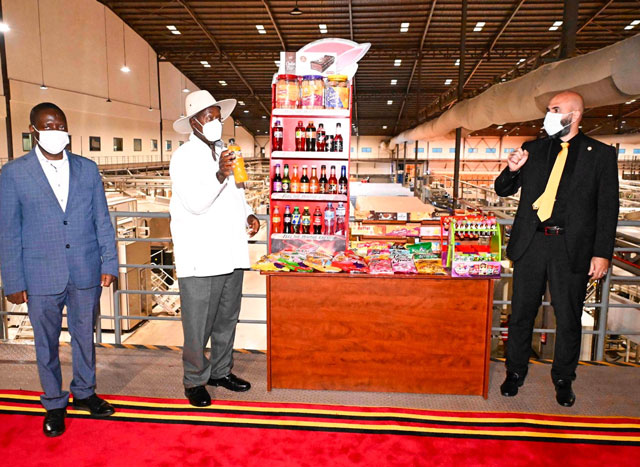
Kampala, Uganda | THE INDEPENDENT | President Yoweri Kaguta Museveni has warned government agencies in charge of taxation from imposing direct taxes on large scale manufacturers. This, Museveni said, discourages investment.
Speaking at Hariss International, the producers of Riham products, at their factory in Kawempe, Museveni said he doesn’t want tax agencies to disturb his manufacturers with what he called useless taxes.
“I long ago told everybody concerned that what we lack in Uganda is manufacturing but everything else is there such as peace, infrastructure, among others. Therefore, if somebody is in manufacturing, I don’t want you to disturb him with direct taxes because they are not crucial to us. If somebody builds a factory like this one and he employs 2,000 people and he pays them, we shall benefit indirectly. Let him work and give jobs to our people,” said Museveni.
President Museveni commended the chairman of Hariss International Limited, Yasser Ahmed for contributing to the development of Uganda’s economy. Since its inception in 2005, the company has evolved and expanded its portfolio to more than 50 products such as carbonated soft drinks, natural mineral water, fruit juices, malt & energy drinks, biscuits and sweets among others.
“I want to congratulate Yasser for doing such a good work because what you are doing here is what is needed in Uganda. As you can see from our location on the globe, we are a very strong agricultural country, everything grows here, and we have been growing products since time immemorial. If you read the accounts of the first Europeans who came here like Hannington Speke who came in 1862 and Henry Morton Stanley who came in 1889, they were amazed by the agriculture they found here,” added Museveni.
The President explained that as leaders of the country, they knew that Uganda has a very big economic potential and that is why they managed to transform it into a big dairy producing country and that very soon it will overtake many countries in the world which produce milk and milk products.
“When the Europeans came, they tried to link us through a few products. That is why by Independence, Uganda’s economy was being described as the economy of the 3Cs (Coffee, cotton and copper and 3Ts (Tobacco, tourism and tea). Now this was a very narrow range of products, and we knew it and us who were through the school system we had been exposed to the global economy, we knew that Uganda had a very big potential not only for the 3Cs and 3Ts but for very many other things,” the President asserted.
“Therefore, when people like Yasser came, we had already started promoting the growing of fruits. In the past, fruits were just for children to eat, not commercial but we knew that they were commercial. If you see on the internet, the global demand for fruits and fruit products is very big. We woke up our people to start growing fruits and they woke up a bit like in Soroti, Luwero, Kayunga and Masaka. They started growing pineapples, oranges and mangoes but we didn’t have processors, and this is what has been delaying our people. Now in Kabale, I introduced apples. Also, Uganda is coming up as a big grape and apple grower in the cold areas,” added the President.
Museveni also described Yasser’s investment as a saviour in Uganda since it links fruit producers with the internal market.
“Eventually we want to be linked with the external market because it is bigger. I therefore thank and congratulate you. You go and tell all the Lebanese to come here because Lebanese are very hardworking people.
For his part Yasser Ahmed thanked the President for supporting investors like him.
“We want to show you that we have fulfilled what we committed to you in 2017 and this is the evidence, you see here in Ttula. The total investment for what you see here is almost $100million. In 2017, our number of employees was 1,380 and now it is 2,000 workers directly and 5,000 indirectly,” said Yasser.
****
URN
 The Independent Uganda: You get the Truth we Pay the Price
The Independent Uganda: You get the Truth we Pay the Price




Casual worker’s salary increase should also be thought of.